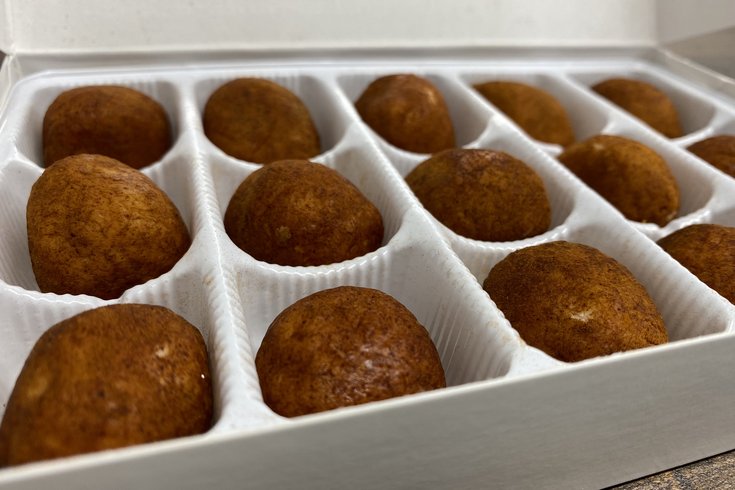
March 15, 2024
 Kristin Hunt/PhillyVoice
Kristin Hunt/PhillyVoice
Irish potatoes are a no-bake St. Patrick's Day treat made with coconut and cinnamon. The seasonal candies are common in the Philadelphia area, but few other places. The box pictured above is sold by the brand Oh Ryan's.
Una McDaid was working in a Havertown child care center the first time she heard of Irish potatoes.
The seasonal candies, typically sold in March for St. Patrick's Day, are well known around Delaware County and the wider Philadelphia area. But McDaid, who moved to Pennsylvania from Donegal, Ireland in 1995, thought her friend was pulling some kind of prank when she announced she'd bought Irish potatoes.
"We liked to have fun with each other a lot, so I actually thought that she seriously brought me a bag of potatoes," recalled McDaid, the director of community engagement and organizing for the Irish Diaspora Center. "I had never heard of them in my life."
The cinnamon-dusted coconut cream treats have no origins in Ireland, despite their name, nor do they contain even a trace of potato. It's unclear who exactly invented them, but many believe they were created by Irish immigrants who settled around Philadelphia in the 19th century, or just enterprising candymakers hoping to cater to St. Patrick's Day revelers. One common story, repeated at the Irish Diaspora Center's weekly senior lunch on Wednesday, is that a Philadelphia confectioner had a surplus of coconut cream Easter eggs and, either intentionally or accidentally, rolled them in cinnamon to resemble potatoes.
Irish potatoes have little name recognition outside the Philly region, making situations like McDaid's somewhat common. Mike Kelly, who immigrated from County Tyrone in Northern Ireland in 1970, remembers a story about an Irish tourist wandering into a local store selling Irish potatoes.
"The lady said, how many you want?" he explained. "She had a little box. (The tourist) said, 'Ah, I need five pounds of them.' She thought they were regular potatoes."
Kelly's wife Anne, a Philadelphia native, made the treats for their kids when they were growing up, and he now enjoys them himself. But the faux-Irish sweets elicit a wide range of responses from the diners at the center. Some insist they have to be homemade, with the right amount of butter so they don't dry out. Others flatly reject them as too sweet and not remotely Irish.
Marie O'Connell, who fled Belfast during the Troubles, prefers an Easter egg made from chocolate in the springtime — though the Easter eggs she made in Northern Ireland were a little different.
"We used to boil eggs," she remembered. "And you know when you boil tea, and (color comes off) the tea leaves? We'd put them in that and it dyed them."
Irish potatoes contain two ingredients rarely associated with the starch- and stew-heavy cuisine of Ireland: cinnamon and coconut. But surprisingly, the latter does figure into the country's holidays, just not the one you'd expect.
"It was always a memory of Halloween for me," McDaid said. "Halloween's a whole different ball game there, but you would trick or treat and you'd get, actually nuts would be the big thing. And you do the bob the apple, all of that. But then our family always just bought a coconut and opened up the coconut.
"It was sort of looked upon as a luxury and definitely a novelty."
Irish potatoes are currently for sale in numerous bakeries and grocery chains carrying the popular Oh Ryan's brand. But the treats have been remixed into forms that stray even further from the vague spud shape. People celebrating St. Patrick's Day at McGillin's Old Ale House this weekend can order an Irish potato martini, or head to Franklin Fountain for a coconut ice cream and cinnamon milkshake.
Follow Kristin & PhillyVoice on Twitter: @kristin_hunt
| @thePhillyVoice
Like us on Facebook: PhillyVoice
Have a news tip? Let us know.